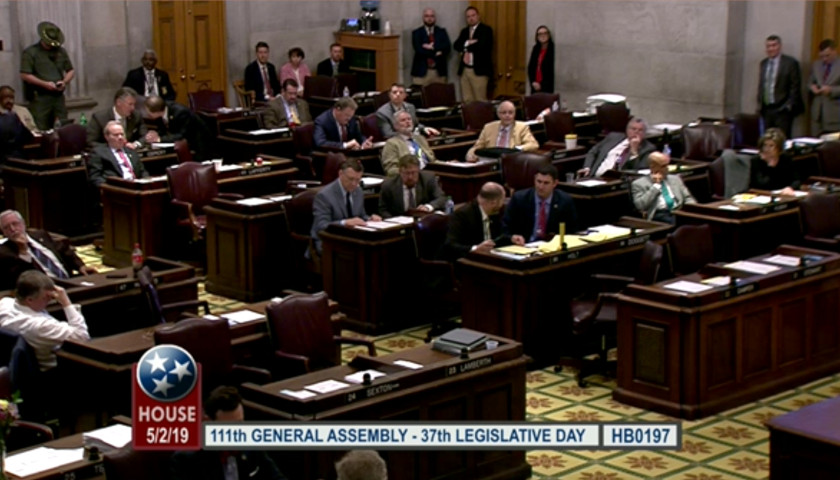Despite media reports suggesting otherwise, when Democrats left the House floor and walked out of the chambers during session, it was they who were in violation of the Constitution of the State of Tennessee and House Rules of the 111th Tennessee General Assembly, not House Speaker Glen Casada.
News Channel 5 reported, “Democratic lawmakers locked inside House chambers.”
News Channel 3’s report titled “Democrat lawmakers locked in House Chamber in Nashville,” said “Democrats are calling what happened a lawless act. Republicans say it was well within the law and necessary.”

Footage in the News Channel 3 report showed people crowding the House Chamber doors and the two visible Sergeants-At-Arms, who were just following the Speakers orders, backed up to the doors. The video captured Joel Ebert of The Tennessean joining in, recording with his phone and asking the Sergeant-At-Arms, “Why aren’t we allowed out? Why aren’t we allowed out of the chamber?”
Also included was Democrat Caucus Chair Representative Mike Stewart of Nashville telling reporters, “The lawlessness and the culture of arrogance that we’ve seen demonstrated throughout this session in ways that have no precedence just was lifted to an entirely new level where you actually had a member, Representative Hardaway, physically restrained from exercising his right as a member to simply walk out during a time of recess into the hallway.”
Background
During the last day of the 2019 session of the 111th Tennessee General Assembly and as the day wore on, some pieces of legislation under consideration became contentious.
In particular, HB 1280 / SB 1428 sponsored by Representative Timothy Hill (R-Blountville) and Senator Paul Bailey (R-Sparta), directs the Governor through the Commissioner of Finance and Administration to submit a waiver amendment to the Centers for Medicare and Medicaid Services (CMS) so that TennCare II funding would be provided via a block grant that would be indexed for inflation and population growth.
To resolve the differences in the House and Senate versions of the bill, a Joint Conference Committee was assigned by the Speaker of each house. While it is a courtesy, it is not required that the Conference Committee composition be bi-partisan.
Apparently reacting to Republican House Speaker Glen Casada (R-Franklin) choosing not to include any Democrats on the HB 1280 / SB 1428 Conference Committee, the majority of the Democrats coordinated a walk-out.
In response, Speaker Casada directed the Sergeant-At-Arms to lock the chamber doors.
As Representative G. A. Hardaway (D-Memphis) tried to exit the House chambers, there was apparently an incident between him and the Sergeant-At-Arms and a member of the Tennessee Highway Patrol.
Democrats claim that Hardaway was restrained from leaving the chambers, while other reports allege that Hardaway pushed either or both of the men.
Sometime later, order was restored to the House chambers and Majority Leader William Lamberth (R-Portland) offered an explanation of the situation at that point.
“I want to say this so that all who are gathered and are listening understands what happened,” said Lamberth.
“We had a few members that had family responsibilities back home. We had some folks that left the chamber that were within the Republican caucus. Those folks, as we went into late hours, decided to go home. They had an excused absence.”
“They checked in with the Speaker and they said here’s what we’re leaving for. As that number began to dwindle a few, we had some contentious bills that came up in which the Republican and Democrat caucuses had a difference of opinion. And, when it came to a certain bill, there were several Democrats that left the room voluntarily. They chose, instead of staying in their seat and serving their constituents, to do a little walkout.”
“For those that are in this room, both Republican and Democrat, I commend you for hanging in there through a very long and difficult day and I appreciate your service to this great state.”
“We have several Republicans members and a couple of Democrats that have come back from family responsibilities and other things that they had to be at – businesses and family – and I commend them.”
“Folks like Susan Lynn,” who had been nodding in agreement with Lamberth as he offered his explanation, “and Ryan Williams and others that have come back here to be here just to make sure that we have a quorum to do the business of the state,” concluded Lamberth.
Lamberth then asked the Speaker for a quorum call.
Speaker Casada first recognized Deputy Speaker Matthew Hill (R-Jonesborough) to say something before the quorum call.
“Thank you Mr. Speaker. I’ve been here 15 years and what happened a few moments ago was the height of cowardice that I have ever seen. The accusations that have been made, the things that have been said recently are beyond the pale.”
“In case you think that I am not correct in what I am saying, I want to read something to you. This is from our House rules.”
Deputy Speaker Matthew Hill read a portion of House Rules number 20, ‘No member shall be absent from service in the House without leave first obtained … the Speaker is hereby authorized to send the Sergeant-at-Arms, or any other person or persons, for any or all absent members. This shall be done at the expense of such absentees, respectively, unless such excuse for nonattendance shall be rendered as the House…’
“Ladies and gentlemen, not only is this in our Rules, we have taken an oath to serve our district. We have taken an oath to serve the people of this state. Ladies and gentlemen, the rules of the House state that if the Speaker of the House deem it necessary to have the doors closed so that the people’s business may be conducted, he or she is well within their rights under our House rules.”
“Membership is not an option. Membership is not an idea. Membership is required. And not only because it is in our Rules, but also because all of us who bothered to stay here and do the work of the people, would agree, that membership is something that we all asked our districts to have.”
“Ladies and gentlemen of the House, Rule 20 is something that we all said we would abide by.”
“Back to what the leader said, I am thankful that we are here to do the business and it is a shame that there are others who are grandstanding in front of the media and who felt it was more important to go hold a press conference than to vote on the issues that we were sent here to debate.”
When the quorum call was taken at the direction of the Speaker, a quorum of 66 members were present as reported by the House Parliamentarian, though most of the Democrats were still absent.
Speaker Casada said, “Let’s do the people’s business. It’s what we were elected to do.”
House Rules and State Constitution Support the Speaker
Media reports and Democrat claims failed to reference two documents that address the issue of member’s attendance and the remedies available to the Speaker when a quorum is not achieved.
All members should be aware of The Tennessee House of Representatives, 111th General Assembly, Permanent Rules of Order, given the process that took place to adopt them at the outset of the 2019 session.
Twelve bi-partisan members of the House were appointed to the Select Committee on Rules, which were based on previous rules with some procedural modifications.
The Rules were presented by Select Committee on Rules Chair Matthew Hill, discussed and debated for the better part of an hour, and then adopted on the 3rd Organizational Day of the House of Representatives, Jan. 10, 2019, by a vote of 80 Ayes, 16 Nays and 2 Present and Not Voting.
Rule 20 of The Permanent Rules of Order that addresses the required attendance of members of the House, which was quoted in part by Deputy Speaker Matthew Hill, reads as follows:
20. ATTENDANCE OF MEMBERS REQUIRED. No member shall be absent from service in the House without leave first obtained; and in case a less number than the quorum of the House shall convene, the Speaker is hereby authorized to send the Sergeant-at-Arms, or any other person or persons, for any or all absent members. This shall be done at the expense of such absentees, respectively, unless such excuse for nonattendance shall be rendered as the House, when a quorum is convened, shall deem sufficient.
Additionally, the Constitution of the State of Tennessee addresses attendance of the members, the broad authority of the Speaker to compel attendance of absent members, as well as the establishment of rules and punishment for violation of the rules. The applicable sections of the Tennessee Constitution from Article II are:
Section 11. The Senate and House of Representatives, when assembled, shall each choose a speaker and its other officers; be judges of the qualifications and election of its members, and sit upon its own adjournments from day to day. Not less than two-thirds of all the members to which each house shall be entitled shall constitute a quorum to do business; but a smaller number may adjourn from day to day, and may be authorized, by law, to compel the attendance of absent members. (emphasis added)
Section 12. Each House may determine the rules of its proceedings, punish its members for disorderly behavior, and, with the concurrence of two-thirds, expel a member, but not a second time for the same offense; and shall have all other powers necessary for a branch of the Legislature of a free state. (emphasis added)
A House member since 2005, Deputy Speaker Matthew Hill told The Tennessee Star as a point of comparison, that during the income tax fight, then Democratic Speaker of the House Jimmy Naifeh sent the Tennessee Highway Patrol around the state to retrieve members and bring them back to the House chambers. He then emphasized that the Speaker has every right to keep members in the chamber.
Hill further told The Star that there is a reason that the Speaker, at the start of a House Floor session, very specifically directs the Sergeant-At-Arms to invite the members in and close the doors.
Ethics Investigation of House Member
At greater issue, and not addressed in the media reports, is the seriousness of the alleged incident that occurred with Representative Hardaway.
There are conflicting reports at to whether Representative Hardaway was manhandled by a Sergeant-At-Arms or Tennessee Highway Patrol, as some Democrats have claimed, or vice versa.
Deputy Speaker Matthew Hill, who is also the Chairman of the House Ethics Committee, told The Star that the Ethics Committee will be investigating the “very serious charge” of an alleged assault of a Sergeant-At-Arms or a Tennessee Highway Patrolman by Representative Hardaway.
While not yet sure of the timing, Chairman Hill said that the investigation will include reviewing the various recorded videos of the incident as well as gathering statements from the involved parties and those who witnessed the incident.
Ethics Committee Chairman Hill said that the possible course of action, should the investigation reveal that Representative Hardaway did commit an assault, includes a criminal arrest, censure or expulsion from the body, which he classified as “extreme.”
– – –
Laura Baigert is a senior reporter at The Tennessee Star.





